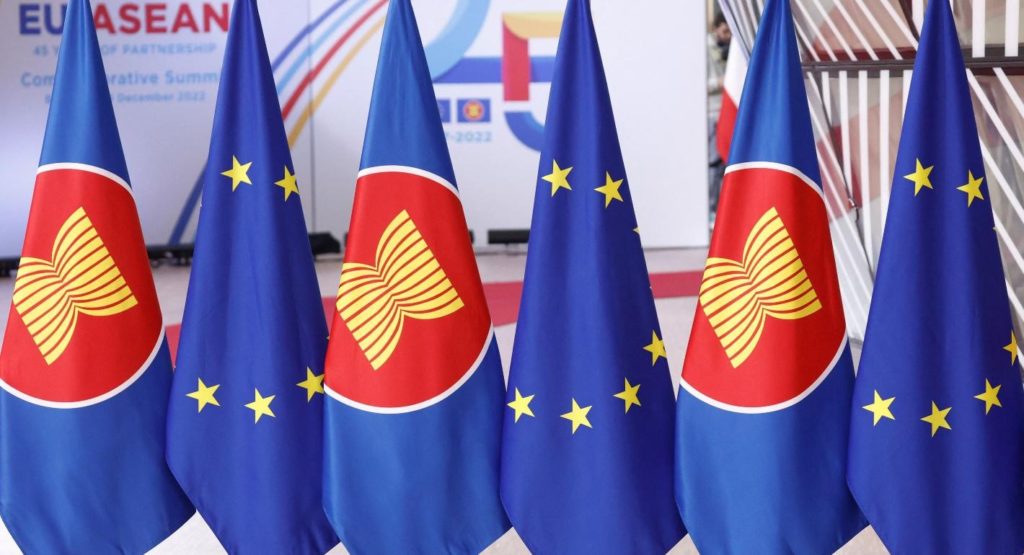Highlight 38/2023 – ASEAN’s Burgeoning Role as a Regional Middle Power: Opportunities for Deepening ASEAN-EU Relations
Wan Ashrul Amahl Bin Mohamad Azmi, 15 December 2023

The Association of Southeast Asian Nations (ASEAN) has emerged as a dynamic regional force, playing a pivotal role in shaping the geopolitical landscape of Southeast Asia. In recent years, ASEAN has made significant strides in becoming a regional middle power, fostering economic growth, promoting regional stability, and enhancing diplomatic ties. Founded in 1967, ASEAN initially focused on economic cooperation and conflict resolution among its member states. Over time, the organization has evolved into a multifaceted entity, addressing not only economic issues but also security, socio-cultural concerns, and regional diplomacy. Its commitment to the principle of non-interference, respect for sovereignty, and consensus-based decision-making has contributed to regional stability and earned it a crucial role in the international arena.
With an average annual GDP growth rate of 4.1%, ASEAN has become a hub of growth and development. The region’s combined GDP of about USD3.3 trillion in 2021 is the third largest economy in Asia, and the fifth largest in the world after the US, China, Japan and Germany. This economic dynamism has positioned ASEAN as a regional economic powerhouse with the potential to shape global trade and investment trends. Diplomatically, ASEAN’s ability to navigate complex geopolitical issues has garnered respect. The organization has been instrumental in fostering dialogue and cooperation, mediating conflicts, and promoting regional security. ASEAN’s role in the South China Sea dispute, for instance, exemplifies its commitment to peaceful conflict resolution and the maintenance of regional stability.
The development of ASEAN as a regional entity often prompts comparisons with other prosperous regional organisations, such as the European Union (EU). Having been described as a sui generis entity, the EU is sometimes deemed a model for ASEAN. With its emphasis on multilateralism, shared values, and commitment to a rules-based international order, the EU is rather an inspiration. As ASEAN solidifies its status as a regional middle power, it is interesting to look at the relations between the two regional bodies and how they can be strengthened, particularly following their 45th Commemorative Summit in 2022.
Economic integration, security cooperation, environmental initiatives, and socio-cultural exchanges are some of the areas highlighted in the Plan of Action to implement the ASEAN-EU Strategic Partnership (2023–2027), creating a multifaceted partnership that extends beyond economic ties to encompass shared values and diplomatic relations. Despite the vast opportunities for cooperation, much could still be done to surmount potential challenges. For instance, on the economic front, it is imperative to advance the ASEAN-EU free-trade agreement (FTA), as the President of the European Commission, Ursula von der Leyen highlighted, it is much more than tariffs and quotas; it is a vehicle of trade. More daunting still, the issue of authority over their respective foreign policies through the ASEAN External Relations and the European External Action Service (EEAS). Future research in this area could be conducted in order to strike a balance between the benefits to the region and the competencies of individual states. This is especially important with the significant changes in Asia and Europe’s geopolitical landscapes over the last decades that have exposed the ASEAN and the EU to security and economic vulnerabilities, particularly in the context of the US-China rivalry.
As ASEAN asserts itself as a regional middle power, the potential for deepening relations with the European Union becomes increasingly promising. The collaboration between these two dynamic regional blocs can not only enhance their economic prosperity but also contribute to global stability, security, and sustainable development. By seizing the opportunities presented by their shared values and goals, ASEAN and the EU can create a formidable partnership that extends beyond regional boundaries, shaping the future of international relations.
Wan Ashrul Amahl Bin Mohamad Azmi, Highlight 38/2023 – ASEAN’s Burgeoning Role as a Regional Middle Power: Opportunities for Deepening ASEAN-EU Relations, 15 December 2023, available at www.meig.ch
The views expressed in the MEIG Highlights are personal to the authors and neither reflect the positions of the MEIG Programme nor those of the University of Geneva.
